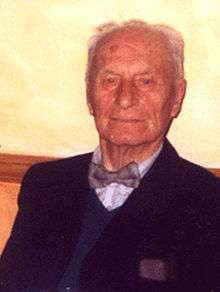Grigori Tokaty
| Grigori Tokaty | |
|---|---|
 | |
| Born |
13 October 1909 Seker, Terek Oblast, Russian Empire |
| Died |
23 November 2003 (aged 94) Surrey, UK |
| Known for | aerodynamic and rocket technology. |
| Spouse(s) | Aza Baeva |
Grigori Aleksandrovich Tokaev (Russian: Григорий Александрович Токаев; Ossetian: Токаты Ахмæты фырт Гогки; also known as Grigory Totakty; born October 13, 1909) was a rocket scientist and long-standing critic of Stalin's USSR.[1]
Pre war science work
He served as Head of Aeronautics Laboratory, Zhukovsky Academy 1938-41. After receiving his doctorate in technical sciences in 1941 he continued to lecture at the Zhukovsky Academy. Simultaneously he worked as Acting Head of the Department of Aviation at the Moscow Engineering Institute. One of his tasks was to study the possibility of developing a medium-range winged rocket.
Great patriotic war and aftermath
Hitler launched Operation Barbarossa in 1941 rapidly overrunning Soviet front-line forces. The Academy's staff was evacuated to Sverdlovsk in the Urals. Tokaty returned to Moscow during the Battle of Moscow. He later flew in bombing raids over Stalingrad using American bombers delivered through lend-lease.
By the end of the Second World War he had become a leading Party representative and academic. This was at the Zhukovsky Academy (now back in Moscow) and the Moscow Engineering Institute.
After German capitulation in May 1945 in the following month in June he was sent to Berlin. This was to serve on the Soviet Control Commission working directly under Marshals Georgi Zhukov and Vasily Sokolovsky. As such he gained access to top-secret communications between the General Staff and the Kremlin.
Life in UK
He moved to Britain shortly after the war in 1948. He later became Professor in the Department of Aeronautics and Space Technology at the City University in London from 1967 to 1975. He regularly appeared in the New Scientist magazine.[2] He also appeared in episode five[3] of the now famous TV series The World at War where he gives a recollection of his experiences.[4]
References
- ↑ http://www.nationalarchives.gov.uk/education/heroesvillains/g4/cs2/g4cs2s5.htm
- ↑ New Scientist Feb 20, 1975, New Scentist Jul 8, 1971, New Scientist Jan 20, 1973
- ↑ https://www.youtube.com/watch?v=olYUrlIfWg0
- ↑ The World at War, Episode 5; Barbarossa originally broadcast 21 November 1973